
Lit Hub’s Most Anticipated Books of 2021
228 Books We're Looking Forward to This Year
JULY
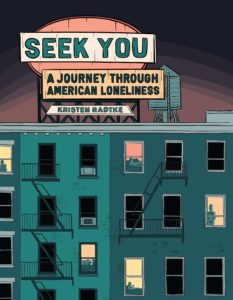
Kristen Radtke, Seek You, Pantheon (July 6)
Kristen Radtke’s stunning 2017 graphic memoir, Imagine Wanting Only This, was a starkly gorgeous journey through the ruins of abandoned places, as well as a profound interrogation of the author’s own feelings of grief, alienation, and ennui. Her latest work, a meditation on isolation and longing, examines the silent epidemic of loneliness in America, from the invention of the laugh-track to the unethical experiments of Harry Harlow. Radtke is a writer of enviable emotional intelligence, and one of our most elegant and virtuosic artists of devastation. –DS
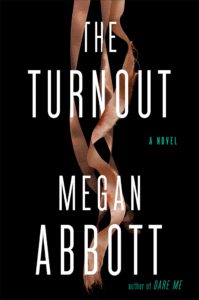
Megan Abbott, The Turnout, Putnam (July 6)
Megan Abbott has already written about the high-stakes (and highly dangerous) sports of cheerleading and gymnastics, and now she turns her attention to the world of ballet. In this semi-gothic tale of a family-run ballet studio, two sisters teach the classes while their injured brother runs the office. Their parents died in a suspicious accident over a decade earlier, but suspicions and resentments need the arrival of an interloper and a ballet season beset by disaster in order to be let loose in their fully monstrous forms. Abbott is not only a suspense author at the top of her game, she’s also a scholar, and The Turnout promises to be both homage to classic tropes and visionary model for their evolution. –MO
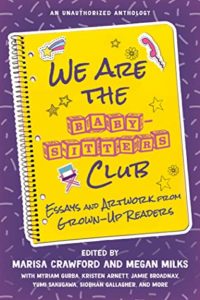
Marisa Crawford and Megan Milks, eds., We Are the Baby-sitters Club: Essays and Artwork from Grown-Up Readers, Chicago Review Press (July 6)
One of my happiest moments of 2020 was binge-watching Netflix’s The Baby-sitters Club with my seven-year-old niece—it was the first time we ever watched something we were equally invested in. I’m excited to keep the BSC vibes going with this fun anthology, featuring work from Myriam Gurba, Kristen Arnett, and others. –ES

Beth Morgan, A Touch of Jen, Little, Brown (July 13)
Sometimes it seems like a book is marketed just for you—and I haven’t been so pumped by publicity copy since Mona Awad’s Bunny (which was pitched as “Heathers meets The Vegetarian” and pretty much held up). This time it’s “Ottessa Moshfegh meets David Cronenberg” but also “a love triangle so toxic that it breaks the order of the universe and unleashes a literal monster.” Reader, it is that toxic. And like Bunny, this book, which masquerades as a funny, mean millennial comedy of un-manners for quite a while until it Takes A Turn, is at least as fun and insane as its comps suggest, if not more. I suspect it’ll be perfect for whatever fresh hell summer 2021 will bring. –ET
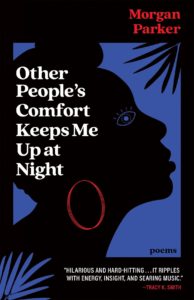
Morgan Parker, Other People’s Comfort Keeps Me Up at Night, Tin House (July 13)
If you, like me, were introduced to Morgan Parker’s work through There Are More Beautiful Things Than Beyoncé (or her 2019 NBCC award-winner Magical Negro), you’ll be pleased to know that Tin House is rereleasing her debut collection, Other People’s Comfort Keeps Me Up at Night, a perfectly Parker-esque take on 21st-century life that’s as sharp and funny as it is powerful. –ES
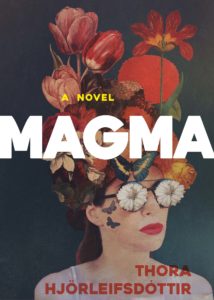
Thora Hjörleifsdóttir, tr. Meg Matich, Magma, Black Cat (July 13)
You are a student at university. You fall head over heels for a man you think is beautiful and smart, despite his constant interrogation of your sex life, your chlamydia, your devotion to him. He lives with a sluggish, sloppy roommate in a sour-smelling cesspool of an apartment, but you love being with him anyway. He’s a vegetarian and scoffs at meat-eaters, so you start eating healthy. He banters with his ex-girlfriend about Derrida and the sex they once had. You spend all your time with him and when you can’t, he gets gloomy, moody. You feel guilty. He sleeps with someone else. You get mad. But get over it quickly. And so it goes. His disrespect for you gets worse. But you don’t notice because the nicks are so small, at first anyway. But you love him. You forgive him. You make excuses. You move in.
People sometimes accept certain forms of abuse, often unnoticeable, but always cumulative, generally until it’s too late: until we’ve lost ourselves, our self-esteem, or everything we once held dear, including our lives. Hjorleifsdottir traces this evolution in bulleted, candid, first-person prose that parallels the quickness in which women’s lives can become less their own. It’s a story as old as love itself but today, the abuse is weaponized by the normalization of such things as internet pornography. At its center is a woman with a heart and dreams as big as the sun, but both shrivel the closer she moves toward this man and away from self. –KA
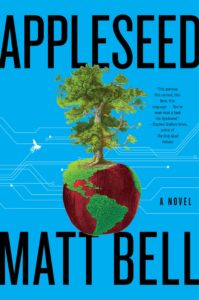
Matt Bell, Appleseed, Custom House (July 13)
Matt Bell follows in the tradition of Kim Stanley Robinson and William Gibson with Appleseed, an epic tale of our coming eco-pocalypse, split between a near-future dystopia at a crossroads, and the distant figures of the future who try to parse what all went wrong. At the heart of both stories is the wondrous apple, and its arsenic-laden seeds. –MO
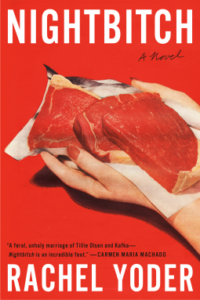
Rachel Yoder, Nightbitch, Doubleday (July 20)
Personally, I’m sold on the cover and title alone. But then there’s the premise: an artist gives up her life to become a stay-at-home mom and then . . . turns into a dog. Or believes she does, at least. So consider me sold twice. Also, um, Carmen Maria Machado called it “a feral, unholy marriage of Tillie Olsen and Kafka,” which has to be one of the best blurbs I have ever read. Send me all your feral, unholy books, please. –ET
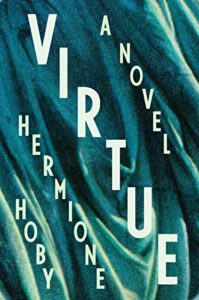
Hermione Hoby, Virtue, Riverhead (July 20)
British author and cultural critic Hemione Hoby’s new novel is the story of a young intern at a once-prominent magazine who is sucked into the marriage of a glamorous and wealthy white couple. Luca is both unnerved and seduced by the relationship dynamics and opulent lifestyle of this famous artist and her filmmaker husband, until a terrible tragedy back in New York jolts him out of his fever dream. Hoby’s luminous 2018 debut, Neon in Daylight, was rightly compared to Renata Adler’s Speedboat, Elizabeth Hardwick’s Sleepless Nights, and Joan Didion’s Play It as It Lays, and her book reviews are always blazingly intelligent and insightful, so I’m greatly looking forward to what promises to be another compelling, cerebral, and linguistically dazzling coming-of-age tale. –DS
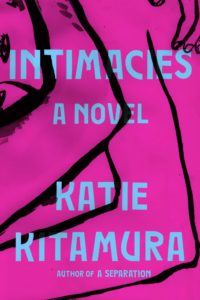
Katie Kitamura, Intimacies, Riverhead (July 20)
I loved Kitamura’s last novel, A Separation, and really, I’d follow her anywhere. But I’m also very much into the sound of this novel, in which an interpreter at the Hague’s International Court becomes entangled in conflicts personal, political, and ontological, and “her coolly impassioned views on power, love, and violence, are tested, both in her personal intimacies and in her role at the Court.” –ET

David Searcy, The Tiny Bee That Hovers at the Center of the World, Random House (July 20)
Once you step inside David Searcy’s sentences, you will not want to leave: artful, Sebald-like, they are as far-reaching as the telescope he hauled out one autumn night in Texas when he showed me the moon. The pace of this philosophy/memoir/mediation/book-length essay is intentional, just like the one-fingered strokes of the typewriter he still uses to write with. He rolls his ideas and observations like marbles in a pocket, until they tumble out smooth and perfectly rounded, which is precisely how he speaks too, should you ever have the pleasure. The Tiny Bee is about everything, in that it’s a “accumulation of ideas toward what the future ought to look like.” On a more earthly plane, it’s about Texas, photography, Martian dust, art, the roads he takes and the ones he doesn’t, and the terrestrial both real and imagined. Even when he writes about fearful, existentialist things, he still makes us feel cozy, like nuzzling a wolf.
If you couldn’t already tell, Searcy is one of my favorite writers—ever. When he writes about building The Mars Receiver (a device to receive signals from Mars, a gesture of hope rather than an actual functioning instrument), he turns a step-by-step tuitional into a work of art: “…first of all, it had to look good. Through my wintery, sad opacity of mind it had to glow. Give forth that clear, intuitive, radiant sense of functional intercessions. Get the faceplate . . . Establish that. The circular screen, the lights and toggle switches. Then attend to theory or whatever passes for it. One can always plead conceptual art, of course. Concept or not. But that’s not it. Start with a beautiful thing, then bring the angels to it.” If you have a soul, you will love this book and Searcy’s writing. –KA
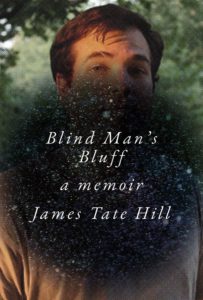
James Tate Hill, Blind Man’s Bluff, W. W. Norton (July 27)
Very large disclaimer: James Tate Hill is a regular contributor to Lit Hub and has always been a writer of deep wisdom, kindness, and—crucially, lest the first two traits get irritating—humor; I can’t imagine a more companionable voice to spend hundreds of pages with. For years Hill refused to accept his diagnosis of Leber’s hereditary optic neuropathy, and went to great lengths to hide his growing visual impairment from the most important people in his life—until it all became just too much. –JD












